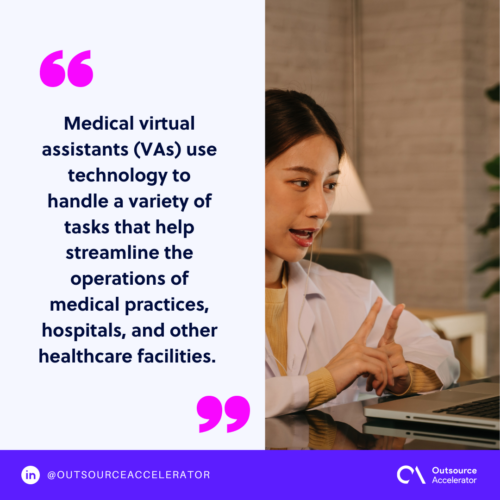5 things to do before hiring a medical virtual assistant

Medical practitioners always seek means to improve efficiency, reduce administrative burdens, and enhance patient care as the healthcare environment rapidly evolves.
One of the most effective solutions to these challenges is hiring medical virtual assistants (VAs). These skilled professionals take on various administrative and clinical tasks, allowing healthcare providers to focus more on their core responsibility – patient care.
Medical virtual assistants are transforming the way healthcare practices operate. However, many practitioners are still finding it difficult to know how and where to hire VAs with the kind of skills and expertise they need.
In this article, we’ll dissect the role of these VA specialists, determine the tools and resources they need to perform their job well, and discuss five things to do before hiring a medical virtual assistant.
The goal is to ensure that you make an informed decision that benefits your practice and patients.
What is a medical virtual assistant?
Medical virtual assistants (VAs) use technology to handle a variety of tasks that help streamline the operations of medical practices, hospitals, and other healthcare facilities.
By taking on routine responsibilities, these VAs enable healthcare providers to concentrate more on patient care and less on repetitive mundane tasks.
Here’s a list of the common roles and responsibilities of a medical virtual assistant:
- Appointment scheduling – Manage patient appointments, reschedule, and send reminders.
- Medical billing and coding – Handle insurance claims, verify insurance details, and process billing.
- Patient communication – Respond to patient inquiries, follow up on appointments, and relay information.
- Electronic Health Records (EHR) management – Update and maintain patient records, ensuring accuracy and confidentiality.
- Administrative support – Perform tasks like data entry, document preparation, and filing.
- Prescription refills – Coordinate prescription refills with pharmacies and ensure timely patient notifications.
- Insurance verification – Verify patient insurance coverage and benefits before appointments.
- Medical transcription – Transcribe medical reports and patient notes from audio recordings.
- Compliance and regulatory tasks – Ensure all procedures and documentation meet healthcare regulations and standards.
- Patient billing and collections – Prepare and send out patient bills, manage collections, and set up payment plans.
Medical virtual assistants are valuable assets for healthcare practitioners. They offer essential support that enhances the efficiency and effectiveness of medical practices.

Tools to provide medical virtual assistants
Healthcare firms must provide medical billing VAs with these necessary tools and resources to ensure that they can perform their roles effectively.
- Medical billing software – Tools like Kareo, AdvancedMD, or PracticeSuite for efficient claim processing and management
- Electronic Health Record (EHR) system – Access to patient records through systems like Epic, Cerner, or Meditech
- Secure email and communication platforms – Encrypted email services and secure messaging apps for patient communication
- Claims management system – Software for tracking and managing insurance claims, such as TriZetto or Waystar
- Practice management software – Comprehensive tools for scheduling, billing, and reporting, such as Athenahealth or eClinicalWorks
- Coding references and tools – Access to ICD-10, CPT, and HCPCS coding resources and tools like AAPC Coder
- Compliance and regulatory resources – Up-to-date information on healthcare regulations, including HIPAA compliance tools
- Secure file storage and sharing – Platforms like Dropbox Business or Google Drive with encryption for storing and sharing documents
- Accounting and financial software – Tools like QuickBooks for managing financial transactions and generating reports
- Training and support resources – Ongoing training programs, webinars, and support forums to stay updated with industry changes
- VoIP phone system – High-quality headset and voice-over-IP phone service for clear communication with patients and insurers
Providing these essential tools leads to smoother operations and improved financial health for healthcare practices.
5 things to do before hiring a medical virtual assistant
To ensure you find the right fit and maximize the benefits of employing medical VAs, it’s essential to take certain preparatory steps.
Here are five key things to do before hiring a medical virtual assistant:
1. Identify your needs
Determine the specific tasks and responsibilities you need the virtual assistant to handle.
Whether it’s appointment scheduling, medical billing, or patient communication, having a clear understanding of your needs will help you find a candidate with the right skills and experience.
2. Set a budget
Establish a budget for hiring a virtual assistant. Consider the cost of hourly rates or monthly fees and factor in any additional expenses for tools and software.
A well-defined budget ensures you can afford the assistant without straining your practice’s finances.
3. Define job requirements
Create a detailed job description outlining the roles, responsibilities, and qualifications required.
Specify any necessary certifications, experience in medical billing, familiarity with EHR systems, and soft skills like communication and attention to detail.
4. Choose the right platform
Decide where to find your medical virtual assistant. Your options include freelance platforms, virtual assistant agencies, outsourcing providers, and professional networks.
Each platform has its advantages, so select one that aligns with your practice’s needs and hiring preferences.
5. Plan the onboarding process
Develop a comprehensive onboarding plan to integrate the virtual assistant smoothly into your practice. The plan should include:
- Training on your systems and processes
- Introductions to team members
- Access to necessary tools and resources
Effective onboarding ensures the assistant can start contributing quickly and efficiently.

Hiring a medical virtual assistant
Before you embark on the journey of hiring a medical virtual assistant, it’s crucial to lay the groundwork to ensure a smooth and successful integration into your practice.
Know what tasks you can allocate to your VA, determine the tools you should provide, and follow the the things to do before hiring a medical virtual assistant.
Now, you’ll be well-equipped to hire a medical virtual assistant who can significantly enhance your practice’s efficiency and allow you to focus more on providing exceptional patient care.







 Independent
Independent




